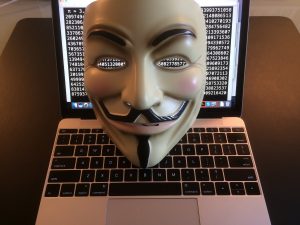In January of 2023, netizens witnessed the No Fly list leak by hacktivist Maia Arson Crimew from it’s personal blog, which was reposted via screenshot to popular online platforms including Twitter (X) and Tumblr. This post spotlighted the small world of online hacktivism, distinguished for its goals of improving internet safety and debunking myths often pushed by right wing sources. This community has since grown in size, as many people interested in computer science are moving towards this form of activism as a way of indulging in their hobby.
Mostpeople think of someone bad when they hear the word “hacker,” but that may not be the case for all hackers, even if the practice is considered illegal in some circumstances. When it comes to hacktivists, they often have an important motive behind what they do. As Purdue’s CyberTAP program defines it, “hacktivism is an act of civil disobedience using computer technology to promote a political agenda… Most hacktivists or hacktivist groups target large entities like governments, corporations, or individuals in positions of power.” To add onto Purdue’s definition, many hacktivists also may target things that violate the privacy of internet users, such as spy and stalker-ware.
Hacktivism online, as it has gained more traction in recent years, has made many people interested in studying cybersecurity. Though this may seem like it has reasonable overlap, hacktivism and cybersecurity are not the same and do not achieve the same goals. As Crimew puts it, “most people who study cybersecurity because of me don’t seem to necessarily aim to become activists, but they all share a certain drive to do good for society. This is a humble cause… but it unfortunately ignores the reality of the corporate cybersecurity world and seems to be built on a fundamental misunderstanding of my values.”
When Crimew released their article “How to Own an Airline in 3 Easy Steps,” it released a whole new perspective on the No Fly list, several articles being published exposing the No Fly list for targeting Muslims. According to Caroline Marks and Zoha Raza for Asian law Caucus, 98% of the names found on the No Fly list are of Muslim origin. Communities where the majority of the population were the most affected, and other groups such as people with Russian names or surnames have also been put on the No Fly list simply due to what their name is. Many other hacktivism data breaches that happened in the past have also revealed unpleasant data surrounding these topics. This is really where hacktivism shines— a way to express political freedom while keeping fellow netizens safe. This political freedom, and the general lax attitude of the internet, has gathered many marginalized groups to participate in hacktivism, creating tight-knit communities of LGBTQ and POC who choose to hacktivism as a way to protest social inequality.
It’s been mentioned a few times that hacking is an unsafe act, but why? For starters, hacking is illegal. Under the Computer Fraud and Abuse Act of 1996, accessing a protected computer without prior or current authorization is illegal, and is used in many cybersecurity cases, especially when it comes to government security. To use a previous example that explains a different situation a hacktivist could get into; when Crimew leaked the No Fly list, it stirred up a lot of trouble within the U.S.. As Matthew Foldi under U.S. Congressman Mike Ezell reports, “in a letter sent this morning to T.S.A. administrator David Pekoske… Bishop — and Homeland Security chairman Representative Mark Green — outlined a series of questions about the ‘alarming’ hack, which the members call ‘a matter concerning cybersecurity, aviation security, as well as civil rights and liberties.” Causing such a disruption to national security can often be what a hacktivist wants to see, but it is often illegal and dangerous nonetheless.
Hacktivism has been a practice for decades, and as the internet becomes more and more consumerism-based or corporatized, it may continue to rise in popularity. Though it is an important leg of activism, it is also important to recognize that in most circumstances, hacking is still illegal. There are many communities online, on websites like Discord, that promote safe legal ways to exercise netizen’s freedom on the internet. Internet safety is important, and so is one’s political and legal safety, and being in the right place and the right time can save you from a lot of work.







